BELOW THE FOLD
Above the Fold, a new play making its debut at the Pasadena Playhouse, has two major flaws that result in an evening of uninspired theater: both a lack of credibility and compelling dramatic action.
Written by former The New York Times reporter-turned-playwright Bernard Weinraub, Above the Fold follows a journalist from a major New York newspaper who covers a racially explosive alleged-rape case at a Southern university fraternity house. It was inspired by a 2006 criminal case in which three members of the Duke University lacrosse team in North Carolina were accused of raping an African 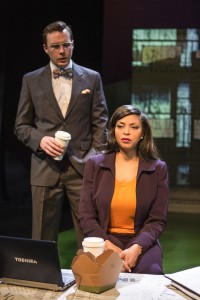 American student from another university who worked as a stripper. All charges were eventually dropped, and a state investigation concluded there had been no rape or assault.
American student from another university who worked as a stripper. All charges were eventually dropped, and a state investigation concluded there had been no rape or assault.
That the Duke University incident created a media frenzy and inflamed racial tensions is unquestionable. And undoubtedly, the case could make for a compelling stage drama exploring issues of media bias and the human fallout from that.
But you won’t find it in Above the Fold, a title which refers to front-page placement of a story on the top half of the paper. To begin with, it’s hard to believe that the protagonist (Jane, played by Oscar-nominee Taraji P. Henson) is really a reporter with what is almost certainly – though not stated explicitly – The New York Times. Her reporting methods are so shoddy and so implausible, her choice of adjectives in her story so inflammatory, that it’s hard to believe her stories would get past an editor (and indeed, an editor, played by Arye Gross, is actually coaching her).
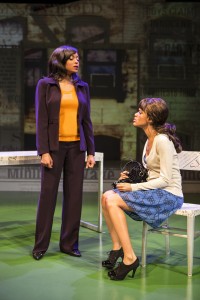 Examples abound, including an early scene in which she interviews the district attorney (Mark Hildreth as Lorne) and feeds him the quotes she wants. And when she finally does interview the alleged rapists, who claim innocence and who reveal that not all is as it seems with these frat boys, she doesn’t even file a story, but reduces them to four words in an article: “The students deny it.”
Examples abound, including an early scene in which she interviews the district attorney (Mark Hildreth as Lorne) and feeds him the quotes she wants. And when she finally does interview the alleged rapists, who claim innocence and who reveal that not all is as it seems with these frat boys, she doesn’t even file a story, but reduces them to four words in an article: “The students deny it.”
The playwright would have us believe that news organizations have an agenda and are incapable of reporting objectively, and that many reporters, fueled by blind ambition, will put aside their journalistic training and ethics if it serves their own purpose. Indeed, Jane wants to be sent to Afghanistan and eventually be on the masthead of the paper as a major editor, and sees her North Carolina reporting as her ticket. I could buy that argument if we were talking about almost all television, most bloggers, perhaps even smaller newspapers or sensational ones like the New York Post. But The New York Times?
 Admittedly, I have my own bias, having been a newspaper reporter for 10 years in the late 70s through the late 80s and a Los Angeles Times freelancer for several years during the 90s. (And yes, I’m aware that the industry has gone through huge changes, but I still read reputable papers and can clearly see that solid journalism still survives.) So, I’m probably much less forgiving of these script transgressions than the average audience member.
Admittedly, I have my own bias, having been a newspaper reporter for 10 years in the late 70s through the late 80s and a Los Angeles Times freelancer for several years during the 90s. (And yes, I’m aware that the industry has gone through huge changes, but I still read reputable papers and can clearly see that solid journalism still survives.) So, I’m probably much less forgiving of these script transgressions than the average audience member.
But putting aside the credibility issue, a far bigger problem with Above the Fold is its absence of compelling drama. We don’t really care about these characters. Sure, Jane struggles as she starts to see holes in the alleged rape victim’s story (though she eventually sells out to get that coveted foreign correspondent post). But we don’t really connect in an emotional way with that struggle. If we had seen the consequences of her reporting on the alleged rapists – and one of them has an intriguing back story that could have been the springboard to a much more interesting play – we might care more.
Having little to work with, the actors do a serviceable job under Steven Robman’s direction, but don’t rise above the material given them. As Monique, the stripper, Kristy Johnson gives the strongest performance, most likely because she is well 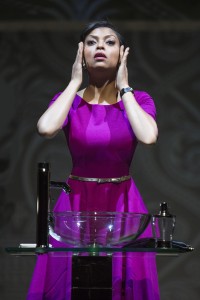 drawn by the playwright.
drawn by the playwright.
A set consisting of suspended TV and iPhone screens, complete with news crawl, doesn’t do anything to add to the production, nor does it provide any new insight into what we already know about media frenzies. (I suspect Jeffery P. Eisenmann’s set design also plays into an ancillary theme in the play, that of the demise of newspapers. Unfortunately, that theme is simply tacked on to the narrative and has no resonance in the context of the play.)
Weinraub is new to playwriting – this is his second play. Let’s hope that next time he can draw upon a lengthy and interesting career covering world affairs, presidential campaigns and Hollywood and come up with a story that would indeed – at least metaphorically speaking – merit coverage above the fold.
photos by Jim Cox
Above the Fold
Pasadena Playhouse
39 South El Molino Avenue
scheduled to end on February 23, 2014
for tickets, call 626-356-7529 or visit www.PasadenaPlayhouse.org
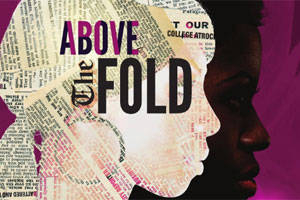
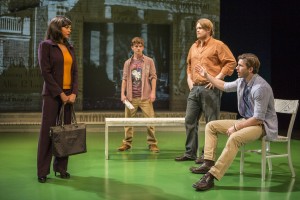

{ 1 comment… read it below or add one }
“The playwright would have us believe that news organizations have an agenda and are incapable of reporting objectively.”
If the Duke lacrosse case is an example of anything, it is an example of just that. DNA tests proved the entire team had no contact with their accuser, two weeks before Nifong made his first arrests. But it took another year to wrinkle the non-case out of the system; and all the while the media (and yes, especially, the Times) were shilling for the prosecution.